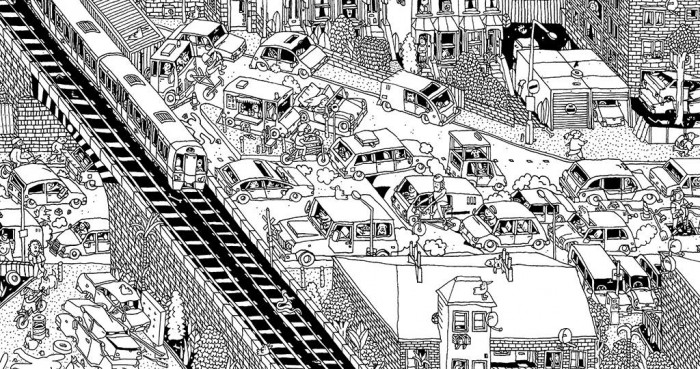From the Series

Do The Green Thing, an environmental charity which describes itself as a “public service for the planet that uses creativity to tackle climate change”, relaunched in February 2016 with an Oscars-Awards-timed piece on how screenwriters and the silver screen are contribution to the ongoing abuse of the planet by setting a terrible example. Their second issue, which was published in May 2016 around the time of London's mayoral elections looks at London's unhealthy addiction to cars. We've republished the text for your information and enjoyment here.
There is an object causing death and destruction in our cities. Easily obtained, widely owned and dogmatically adored, it is a politically loaded tool that is intrinsically connected to our independence, social standing and sexuality. And despite the dangers it presents to our communities, its prevalence remains unchallenged.
That object is a gun in America, and a car in London.
Now, you may think that comparing London’s cars to America’s guns is a stretch, manipulative or just plain dumb. But there are uncanny parallels between the two - from their ramifications on society, to their representations in popular culture and the huge support they each get from interested parties.
Let’s start with the straightforward stuff. The most obvious consequence of guns and cars is that they both kill. In America, 33,599 people die every year because of guns and 33,804 die because of cars. On our bonny shores, cars kill or seriously injure 23,700 people every year, 9 per cent of whom are in London. These numbers don’t even take into account the dangers of simply co-existing with cars - the effects of particulate air pollution kill 40,000 people nationwide and 9,500 in London every year.
9,500 people die every year in London as a result of particulate air pollution.
"Not all guns and cars!" you may cry. "Mine keeps me and my children safe from intruders on my lawn and strangers on the bus." But owning either actually makes your life more dangerous. In America, gun owners are at a higher risk of murder, suicide and accidental death by firearm. In the UK, car occupants are the group most likely to be killed on the road. And you don’t actually have to be in an accident to suffer behind the wheel. Levels of nitrogen dioxide - a pollutant that inflames the lungs, stunts children’s growth and increases the risk of respiratory disease - are 2.5 times higher inside London’s cars than on its streets.
3-million people move to the world’s cities every week.
The world is undergoing the largest wave of urban growth in history. This is only going to make matters worse, as cities are particularly unsuited to guns and cars. In America, homicide rates by gun are much higher in the cores of large metro areas, where there are larger concentrations of gangs and unequal distributions of wealth. In Britain, vehicle accidents tend to happen in cities, which is hardly surprising; a car is a ridiculously inadequate way to squish through the tight grids of buildings, roads and walkways that were originally designed for a very different type of horsepower.
The car was originally designed for city-to-city, longer-distance travel. And trying to use a modern 4.5-metre-long car in a place that was designed for horses is not the way to go. – Richard Aucock, motoring journalist and MD at Motoring Research
So if cars and guns are killing machines that are impractical for our urban surroundings, why do we keep buying them? Pop culture is partly to blame, habitually presenting either as cool, sophisticated and sexy accessories to any successful person’s life.
Although glamorous depictions of guns are rife in movies, TV shows and music, it is car companies’ ability to advertise that gives them the upper hand in popular culture presence. Even if we’re not inclined to lap up five-year-old reruns of Top Gear, we’re constantly assaulted with the promise that four-wheeled metal boxes are wealth-affirming status-defining sex-catalysing must-haves. No wonder we’re desperate to get behind the wheel.
There are groups like the Drivers’ Alliance, who state that ‘freedom to travel is a fundamental human right’ and that any policies that restrict this freedom are flawed. (In case you were wondering, travelling by car isn’t actually covered by the Human Rights Act, which instead chooses to focus a bit more on the right to life, not being tortured, having a fair trial, stuff like that.)
It took just one week for parts of London to breach EU yearly pollution limits in 2016.
Then there’s the Alliance for British Drivers, whose mission is to ‘provide an active, responsible voice to lobby on behalf of Britain’s beleaguered drivers upon many issues, especially those where official policy in recent years has been to discriminate against drivers’. That’s right: in the World According to the Alliance for British Drivers, drivers are principal victims of discrimination in Britain today. Let that sink in for a minute.
Both these advocacy groups come from the position that cars should be put first on the road, championing unfettered personal movement (to the supermarket or school) over collective safety.
But even the individual efforts of organisations like these are dwarfed by the enormously powerful and well-connected groups who stubbornly keep cars and guns on our streets. For America’s guns there’s the NRA and for London’s cars there are fossil fuel companies.
From 2010 to 2014 the Tories received £2.5 million from donors associated with the oil industry.
Companies like BP and Shell enjoy unprecedented access to our ministers, and these relationships have policy implications that keep us firmly in our cars. Take the 2015 Summer Budget, for example, when George Osborne dismantled the current vehicle excise duty taxation system by announcing that all cars were to pay the same £140 annual fee after their first year on the road. From 2017, a one-year-old Range Rover will be taxed at the same rate as a Prius. ’Scuse me whilst I :-|
London’s outgoing Mayor, the scheming but affable Boris Johnson, is also under the pro-car thumb. During his tenure he’s halved the size of the Congestion Charge Zone, put off the introduction of an Ultra Low Emission Zone until 2020 (that you could get out of anyway by paying a daily rate of £12.50) and has wholeheartedly encouraged new-build developments that must be serviced by thousands of construction trucks. And yes, his Vision for Cycling has put more people on bikes, but without robust legislation to get people out of their cars, it’s done little to make London safer or cleaner.
Johnson’s lacklustre approach to congestion has only been made worse by a 25 per cent drop in the price of petrol, 30,000 new Uber app downloads every week, and a population that is set to grow by 1.5 million by 2030.
London is in danger and we must get cars off our streets. We need to do two things in order to achieve this. The first is to take inspiration from our friends in America and have a serious conversation about Car Control. The second is to go further than the Yanks have dared and actually enforce it.
There are 62,754 private hire vehicles in London.
And here’s some good news (finally): Londoners are open to it. The number of cyclists is at a record high, half a billion more public transport journeys take place now than five years ago, a majority support a monthly car-free day in the city and the media is openly calling for the new Mayor to take radical action on congestion.
Before you head to the polls on Thursday [this refers to London's mayoral elections in May 2016], apply an anti-car lens to each candidate’s manifesto. If you don’t have time to do that (because work) then have a read of this. Even if the most anti-car candidate doesn’t get into office (spoiler alert: it’s Sian Berry), demand that the winner (spoiler alert: it will be Sadiq Khan) introduces robust car control policies to our streets, like:
- Increasing the size and cost of the Congestion Charge Zone so that each trip hurts your wallet as much as our environment
- Penalising people who insist on buying second cars, four-wheeled drives or sports cars because they really aren’t practical, even in Chelsea
- Holding Sadiq to his pledge to triple London’s cycle infrastructure because politicians are supposed to serve us, even if BoJo’s track record implies otherwise
And what if these car dethroning policies, and many like them, were put into gear? London’s travel culture would be radically changed, ending a century-long reign of the automobile. Imagine a city where a majority of space actually belongs to its people. Where the air is safe to breathe, where car parks become actual parks, where we aren’t squished onto pavements, where buses don’t get caught in endless traffic and where we feel safe crossing a road or jumping on our bikes.
80 per cent of London’s public space is taken up by roads and streets.
Imagine if our technology put people first and cars second. A CityMapper that lists journeys by foot, bike or public transport before cars, FitBits that measure our carbon offsets as well as our daily steps and an Uber app that asks if you really need to book a car to drive you up the road.
We’re not saying it’s going to be easy to do. Cars are a major part of any Londoners’ daily life and changing that will be a long and difficult process. But it will be worth it.
Update: The votes have been counted, and Sadiq Khan is the new mayor of London. To Sadiq: congrats. And to the many Londoners who support a car-second city: now is the time for action. Let Sadiq know that it's time to curb cars. Remind him of his campaign promises on Twitter - and suggest ways he could take his mandate and go even further.
Car Confessionals
Londoners, let’s stop kidding ourselves. We take far more cars or cabs than we should do, and our reasons are way more pathetic than they should be.
It's time to call bullshit on weak pro-car excuses.
So if you’ve ever made up a stupid excuse to drive, then share it with us on Twitter or Facebook. We’ll be illustrating the best ones in the run up to Thursday’s election and posting them on the Car Confessionals site - a hall of shame for four-wheeled indulgence.
The more we recognise the excuses, the more we’ll recognise that cars are so rarely the best way to go.
Do The Green Thing's co-founder Naresh Ramchandani, Creative Director of Pentagram in London, presented at Design Indaba Conference 2016. His presentation was an ode to his eight favourite words, and beautifully demonstrated the (sometimes overlooked) power of language. One of Ramchandani’s eight favourite words is “change”.







